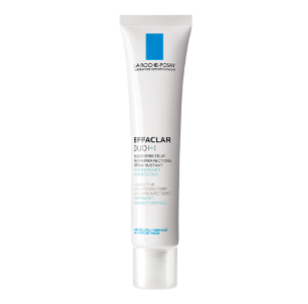La Roche-Posay Effaclar Duo+ and CeraVe Facial Moisturising Lotion: Which Is Best for My Skin Type?
La Roche-Posay Effaclar Duo+ and CeraVe Facial Moisturising Lotion: Which Is Best for My Skin Type?
Both CeraVe and La Roche-Posay are renowned skincare brands, frequently recommended by dermatologists and skincare experts for their no-fuss formulas, clean ingredients, and efficacy.
When it comes to moisturisers, La Roche-Posay Effaclar Duo+ and CeraVe Facial Moisturising Lotion are two incredibly popular products, but they have each been made with different skin types and skin concerns in mind.
Although both products are facial moisturisers with clean ingredients suitable for sensitive skin, they each have very different benefits and features.
Here, we’ll explain the differences between the products and answer some frequently asked questions about La Roche-Posay and CeraVe to help you decide which brand is best for your skin.
In this guide:
What are the goals of the products?
The primary goal of both products is to provide 24-hour hydration for the skin. La Roche-Posay is also designed to brighten, control shine and reduce blemishes, while CeraVe works to protect the skin’s natural barrier and lock in moisture.


The CeraVe moisturiser hydrates by replenishing ceramides to protect the skin and lock in moisture. The Effaclar Duo+ does not have such protective qualities, but it can help to minimise coloured marks on the skin caused by acne scars.
What skin types do the products cater to?
La Roche-Posay Effaclar Duo+ is a dual-action lightweight formula specifically designed for reducing shine in oily skin and preventing breakouts for blemish-prone skin. It is also suited for sensitive skin as it works to reduce pimples, blackheads and acne scars without causing irritation.
The CeraVe Facial Moisturising Lotion is designed for normal to combination skin. It is a lightweight and comfortable to wear moisturiser for all skin types, but is particularly beneficial for those prone to dryness or sensitivity as it provides 24-hour hydration.
Ingredients
La Roche-Posay Effaclar Duo+ contains:
- Glycerin for day-long hydration
- Niacinamide to reduce the appearance of spots
- Zinc PCA to control oil and shine
- Lipo hydroxy acid and salicylic acid to unclog pores and prevent pimples
- Procerad to minimise the appearance of coloured marks.
The CeraVe Facial Moisturising Lotion contains:
- Three essential ceramides to support the skin’s natural barrier
- Glycerin to hydrate
- Hyaluronic acid to help the skin retain moisture
- Patented MVE® delivery technology to ensure long-lasting hydration.
Texture
La Roche-Posay Effaclar Duo+ has a lightweight gel-cream texture. It is absorbed into the skin quickly and leaves a matte finish without any greasiness, particularly when used after the Effaclar cleanser.
The CeraVe Facial Moisturising Lotion has a creamier texture than the Effaclar Duo+, but still feels relatively light on the skin. Dry and sensitive skin should feel soothed and fresh, but for best results be sure to use a hydrating cleanser before application.
Which product is more suitable for me?
Consider your skin type and key skin concerns when choosing between La Roche-Posay Effaclar Duo+ and CeraVe Facial Moisturising Lotion.
Dry skin
The nourishing and hydrating ingredients in the CeraVe moisturiser such as glycerin and hyaluronic acid will suit your skin best.
Oily skin
Designed for everyday use, the mattifying, oil-controlling features of Effaclar Duo+ will be helpful and should provide visible improvements in as little as four weeks.
Acne
Effaclar Duo+ has been formulated specifically for blemish-prone, oily skin, containing salicylic acid and niacinamide. This makes it a good choice for those with acne, particularly when used alongside the Effaclar facial cleanser.
Sensitive skin
Both products are formulated for sensitive skin types, but the CeraVe moisturiser’s protective qualities might best help to control irritation.
Teenage skin
Our teenage years are usually marked by oily and irritated skin prone to acne. With this in mind, the sebum and pimple-controlling ingredients in Effaclar Duo+ is likely the more suitable choice of the two products.
Damaged skin
Damaged skin needs additional protection, which is exactly what the CeraVe moisturiser does by supporting the natural protective skin barrier. CeraVe products are not designed specifically to get rid of acne scars. If acne scars are a key concern, the Effaclar Duo+ moisturiser from La Roche-Posay is likely to be more effective since it works to control the appearance of marks on the skin.
Frequently asked questions
Are La Roche-Posay products natural?
La Roche-Posay products are not made with all-natural ingredients. However, the brand is known for formulating very clean products which are suitable for sensitive skin. Natural ingredients are often included in their formulations and thermal spring water, which has high levels of natural antioxidant selenium, is a key ingredient in all their products.
Is La Roche-Posay chemical and paraben free?
La Roche-Posay products aren’t 100% chemical-free, but they are formulated for and tested on sensitive skin to ensure they are gentle. Most of La Roche-Posay’s products are paraben and fragrance-free, but it’s important to check the ingredients on each individual product. The Effaclar Duo+ moisturiser does not contain parabens.
Do dermatologists recommend La Roche-Posay?
Many dermatologists recommend La Roche-Posay products for the efficacy and suitability for sensitive skin. Surveys conducted in 2019 found that nine out of 10 dermatologists would recommend the Effaclar Duo+ moisturiser.
Is La Roche-Posay good for teenage skin?
La Roche-Posay has a variety of skincare ranges which cater to a number of different skin types, including teenage skin prone to spots, clogged pores and oily T-zones. The Effaclar Duo+ moisturiser is suitable for all age ranges.
Do dermatologists recommend CeraVe?
All CeraVe products are designed and recommended by dermatologists.
Does CeraVe Moisturiser pimples and clog pores?
Although not specifically formulated to tackle pimples, CeraVe Facial Moisturising Lotion is non-comedogenic which means it doesn’t contain ingredients which are likely to clog pores, something which often leads to breakouts.

